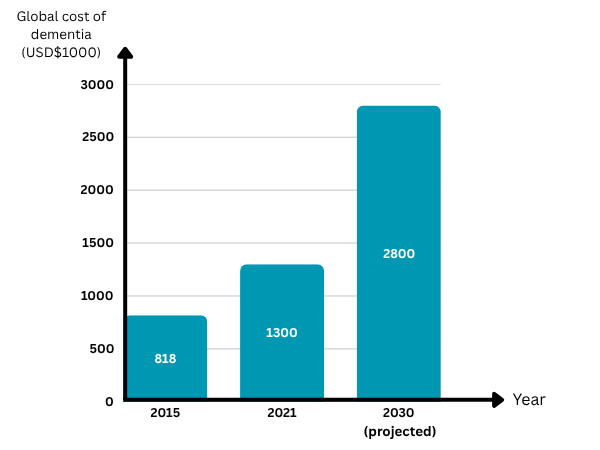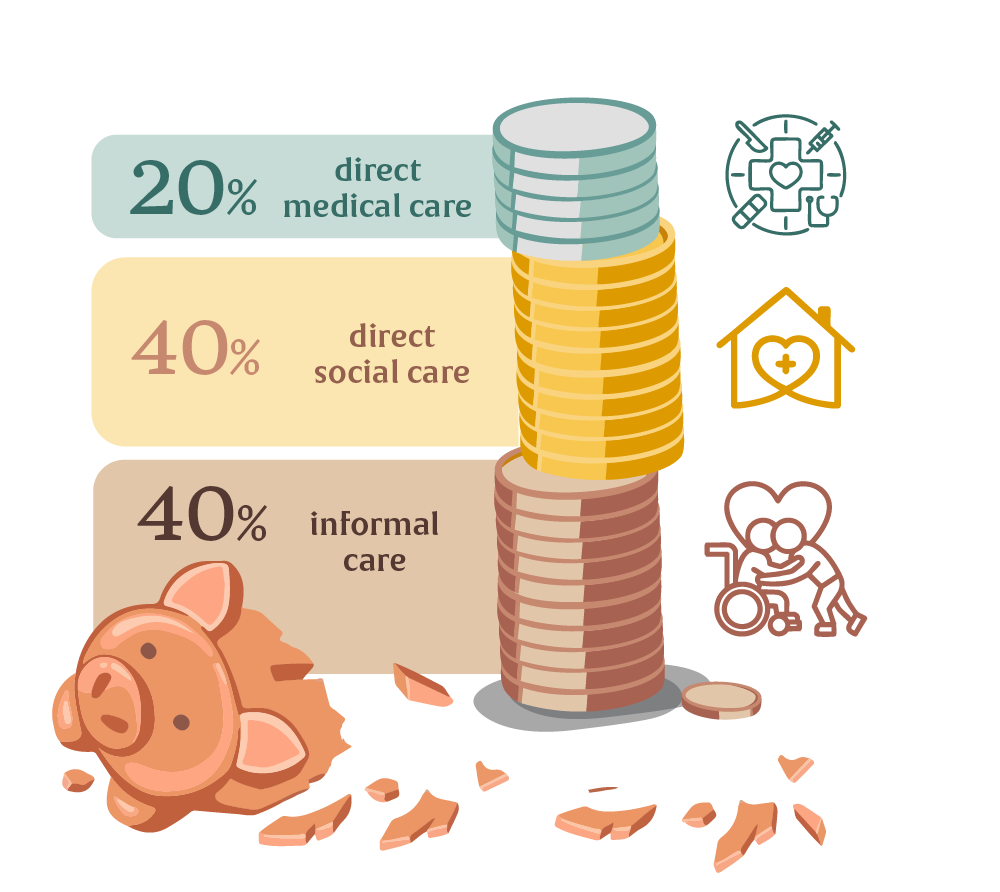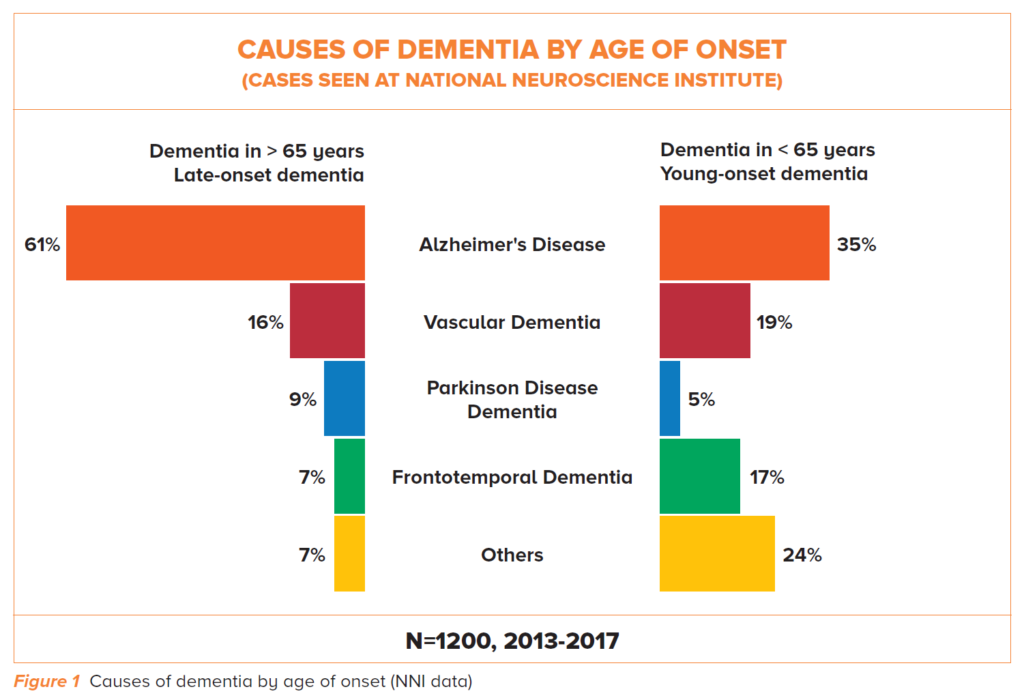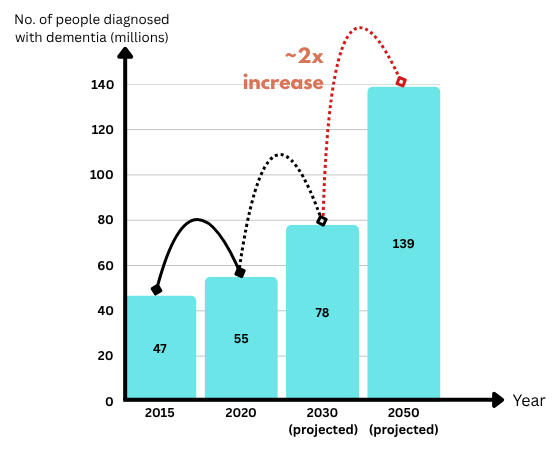Playback speed:
முதுமைக்கால மறதி நோய் என்பது முதுமைக்கால மறதி நோயுடன் வாழும் நபர்கள், அவர்களது குடும்பங்கள் மற்றும் பல்வேறு சமூகப் பங்காளர்களுக்கு நீண்டகால தாக்கங்களைக் கொண்ட ஒரு முக்கியமான பொது சுகாதாரப் பிரச்சினையாகும். நிகழ்வுகளும் கதைகளும் இந்த நிலை குறித்த மதிப்புமிக்க ஆழமான கண்ணோட்டங்களை வழங்கினாலும், முதுமைக்கால மறதி நோயின் சிக்கல்களைப் புரிந்துகொள்வதற்கு உள்ளூர் மற்றும் உலகளாவிய புள்ளிவிவரங்களை முழுமையாக ஆய்வு செய்வதும் அவசியம்.
இந்தக் கட்டுரை முதுமைக்கால மறதி நோயின் புள்ளிவிவரங்கள் பற்றிய விரிவான பகுப்பாய்வை வழங்குவதையும், பரவலான நிலை, தாக்கம் மற்றும் தலையீட்டிற்கான சாத்தியமான வழிகள் குறித்து வெளிச்சம் போட்டுக் காட்டுவதையும் நோக்கமாகக் கொண்டுள்ளது.
உள்ளூர் புள்ளிவிவரங்கள்
பரவலான நிலை
சிங்கப்பூரில், பல்வேறு வயதினரைச் சேர்ந்த மக்களைப் பாதிக்கும் முதுமைக்கால மறதி நோயின் பரவலான நிலை ஒரு குறிப்பிடத்தக்க கவலையாக உள்ளது.
மனநலக் கழகம் (IMH) நடத்திய சிங்கப்பூர் மூத்தோர் நல்வாழ்வு (WiSE) 2023 ஆய்வின்படி, 60 வயது மற்றும் அதற்கு மேற்பட்ட 11 நபர்களில் 1 நபர் முதுமைக்கால மறதி நோயுடன் வாழ்கிறார். இந்தச் சதவீதம் வயதுக்கு ஏற்ப அதிகரிக்கும், அதிர்ச்சியூட்டும் வகையில் 85 வயது மற்றும் அதற்கு மேற்பட்ட 2 பேரில் 1 பேருக்கு முதுமைக்கால மறதி நோய் இருப்பது கண்டறியப்பட்டுள்ளது. 2013 ஆம் ஆண்டு நடத்தப்பட்ட முந்தைய ஆய்விற்குப் பிறகு முதுமைக்கால மறதி நோயின் பரவலான நிலை சற்று குறைந்துள்ளதாகத் தெரிகிறது.
இந்த நிலையின் தாக்கம், சிங்கப்பூரின் மூப்படையும் மக்கள்தொகையை நோக்கிய மக்கள்தொகைசார் மாற்றத்தால் அதிகரிக்கிறது. 2021 ஆம் ஆண்டில் சுகாதார அமைச்சு தெரிவித்துள்ளபடி, அதிகரித்து வரும் ஆயுட்காலம் மற்றும் வேகமாக மூப்படையும் சமூகம் ஆகியவற்றின் மூலம், சிங்கப்பூரில் முதுமைக்கால மறதி நோயால் பாதிக்கப்பட்டவர்களின் எண்ணிக்கை 2030 ஆம் ஆண்டுக்குள் 152,000 ஐ எட்டக்கூடும் என்று கணிப்புகள் தெரிவிக்கின்றன. 2015 ஆம் ஆண்டின் United Nations World Health Prospects (UNWPP) என்பவற்றில் கோடிட்டுக் காட்டப்பட்டுள்ளபடி, 2017 ஆம் ஆண்டில் “மூப்படைந்த சமூகம்” என சிங்கப்பூர் வகைப்படுத்தப்பட்டதிலிருந்து அவற்றின் மக்கள்தொகை மாற்றம் தெளிவாகத் தெரிகிறது, இது 2026 ஆம் ஆண்டுக்குள் “மிகவும் மூப்படைந்த சமூகம்” என்ற அந்தஸ்தை அடையுமென எதிர்பார்க்கப்படுகிறது. அதிகரித்து வரும் முதுமைக்கால மறதி நோயின் பரவல் நிலையை நிவர்த்திச் செய்வதற்கும், இந்த நிலையை உடையவர்களுக்கு ஆதரவளிப்பதற்கும் “விரிவான உத்திகள் அவசரமாகத் தேவை” என்பதை இந்த மக்கள்தொகைப் போக்கு அடிக்கோடிட்டுக் காட்டுகிறது.
அனைத்து வயதினருக்குமான கவலை
சிங்கப்பூரில், முதுமைக்கால மறதி நோய் என்பது வயது வரம்புகளைக் கடந்த பன்முகக் கவலையாக உள்ளது, இது இளம் வயதிற்குள் ஏற்படும் முதுமைக்கால மறதி நோய் (YOD) உள்ளவர்கள் உட்பட அனைத்து வயதினரையும் பாதிக்கிறது. முதுமைக்கால மறதி நோய் முதன்மையாக வயதானவர்களை பாதிக்கிறது என்று பொதுவாக தவறான கருத்து இருந்தபோதிலும், தேசிய நரம்பியல் கழகத்தின் (NNI) புள்ளிவிவரங்கள் பல்வேறு வயதினரிடையே YOD வழக்குகளின் பரவல் நிலையை வெளிச்சம் போட்டுக் காட்டுகின்றன. NNIயில் ஒவ்வொரு ஆண்டும் 100க்கும் மேற்பட்ட YOD அல்லது இளம் வயதிலேயே ஏற்படும் இலேசான அறிவுத்திறன் குறைபாடு (Mild Cognitive Impairment, MCI) கண்டறியப்படுகிறது, இது இளையவர்களிடையே இந்த நிலை அதிகரித்து வருவதைக் குறிக்கிறது.
கடந்த பத்தாண்டு காலத்தில், NNI ஆனது புதிதாக கண்டறியப்படும் YOD வழக்குகளில் நிலையான அதிகரிப்பு நிலவுவதைக் கண்டறிந்துள்ளது, NNI இல் முதுமைக்கால மறதி நோயுடன் வாழும் சுமார் 30 சதவீத நபர்களுக்கு YOD இருப்பது கண்டறியப்பட்டது, மேலும் இந்நிலை கண்டறியப்பட்ட அந்த இளைய நபருக்கு வெறும் 40 வயதுதான். விகிதாசார ரீதியாக, 65 வயதுக்கு மேற்பட்டவர்களுக்கு இந்நிலை கண்டறியப்பட்டதை விட, பக்கவாதம் மற்றும் அதிர்ச்சிகரமான மூளைக் காயத்துடன் தொடர்புடைய காரணிகளால் YOD இன் அதிகமான நிகழ்வுகள் ஏற்படுகின்றன.
2019 ஆம் ஆண்டில், NNI ஆனது 245 புதிய YOD நிகழ்வுகளைக் கண்டது, இது 2013 இல் 60 நிகழ்வுகள் என்பதிலிருந்து குறிப்பிடத்தக்க அளவு அதிகரித்துள்ளது, 2023 முதல் காலாண்டில் தோராயமாக 75 புதிய நிகழ்வுகள் பதிவாகியுள்ளன. இந்த புள்ளிவிவரங்கள், YOD உடன் வாழும் நபர்களுக்கு விழிப்புணர்வை ஏற்படுத்துவது மற்றும் ஆதரவை வழங்குவதன் அவசரத்தை எடுத்துக்காட்டுகின்றன, இது அனைத்து வயதினர் மத்தியிலும் முதுமைக்கால மறதி நோயுடன் வாழும் நபர்களின் பல்வேறு தேவைகளை நிவர்த்தி செய்வதற்காக வடிவமைக்கப்பட்ட விரிவான சுகாதார உத்திகளின் அவசியத்தை வலியுறுத்துகின்றன.
YOD உடன் வாழ்பவர்களுக்கு NNI ஒரு முக்கிய நோயறிதல் மையமாகச் செயல்பட்டாலும், இந்தப் புள்ளிவிவரங்கள் சிங்கப்பூரில் YOD இன் பரவல் நிலையை முழுமையாகப் பிரதிநிதித்துவப்படுத்தாமல் போகலாம் என்பதைக் கவனத்தில் கொள்ள வேண்டும்
பராமரிப்பின் யதார்த்தங்கள்
Caregiving Transitions Among Family Caregivers of Elderly Singaporeans (TraCE) என்ற ஆய்வில் தெரிவிக்கப்பட்டுள்ளபடி, பராமரிப்பாளர்கள் சராசரியாக 62 வயதுடையவர்களாக உள்ளனர், இதில் பெரும்பான்மையானவர்கள் பெண்கள். கூடுதலாக, கணிசமான பகுதியினர் (73%) அவர்கள் பராமரிக்கும் நபரின் பிள்ளைகள் அல்லது மருமகன்(மகள்)களாக உள்ளனர், மற்றவர்களில் வாழ்க்கைத் துணைவர்கள், உடன்பிறந்தவர்கள் மற்றும் பேரக்குழந்தைகளும் அடங்குவர். குறிப்பாக, பராமரிப்பாளர்களில் மூன்றில் ஒருவர் திருமணம் செய்து கொள்ளவில்லை, இது முதுமைக்கால மறதி நோயின் பராமரிப்புப் பொறுப்புகளில் பல்வேறு மக்கள் பிரிவினர் ஈடுபட்டுள்ளதை வலியுறுத்துகிறது.
பராமரிப்பாளர்களின் வாழ்க்கையில் முதுமைக்கால மறதி நோய் பராமரிப்பின் தாக்கம் ஆழமானது, இது அவர்களின் உணர்ச்சி ரீதியான நல்வாழ்வு, நிதி நிலைத்தன்மை மற்றும் ஒட்டுமொத்த வாழ்க்கைத் தரத்தையும் பாதிக்கிறது. 2023 ஆம் ஆண்டில் Milieu மற்றும் Dementia Singapore நடத்திய கூட்டு ஆய்வின்படி, 10 பராமரிப்பாளர்களில் 7க்கும் மேற்பட்டோர் (74%) தங்களின் அதிகப்படியான பொறுப்புகளால் திணறுகின்றனர். நிதி நிலைத்தன்மையைப் பொறுத்தவரை, LIEN (Foundation) அறநிறுவனம் 2018 ஆம் ஆண்டு நடத்திய ஆய்வில், முதுமைக்கால மறதி நோயின் பராமரிப்பானது வழக்கமான சமூக அல்லது பகல்நேர பராமரிப்பை விட கணிசமான அளவு அதிகம் செலவாகும், தோராயமாக 40% அதிகம் செலவாகும் என்று தெரியவந்துள்ளது. அதே நேரத்தில், பல பராமரிப்பாளர்கள் தங்கள் அன்பிற்குரியவர்களைப் பராமரிப்பதற்காக தங்கள் வேலையை விட்டுவிட வேண்டிய கட்டாயத்தில் உள்ளனர், இதன் விளைவாக வருமானம் குறைந்து மன அழுத்தம் அதிகரிக்கும்.
சராசரியாக வாரத்திற்கு 33 மணிநேரம் பராமரிப்பிற்காக அர்ப்பணித்த போதிலும், பராமரிப்பாளர்கள் வரையறுக்கப்பட்ட முறையான பயிற்சி மற்றும் ஆதரவைப் பெறுகிறார்கள், இதில் 5% பேர் மட்டுமே எந்தவொரு பராமரிப்பாளர் பயிற்சியிலும் கலந்து கொள்கிறார்கள் மற்றும் 38% பேர் மட்டுமே பராமரிப்பாளர் பாடப்பயிற்சிகளுக்கான மானியங்கள் குறித்து அறிந்திருக்கிறார்கள். அதிலும், அவர்களில் ஒரு சிறிய சதவீதத்தினர் (28%) மட்டுமே வேலையில் இருந்தால் மூத்தோர் பராமரிப்பு விடுப்பைப் பெறுகிறார்கள், இது பராமரிப்பாளர்களுக்கு மிகவும் வலுவான ஆதரவு அமைப்புகள் அவசியம் தேவை என்பதை எடுத்துக்காட்டுகிறது.
சிங்கப்பூரில் முதுமைக்கால மறதி நோய் பொருளாதார ரீதியாக ஏற்படுத்தும் தாக்கம்
சிங்கப்பூரில் முதுமைக்கால மறதி நோய்க்கான பராமரிப்பு குடும்பங்களுக்கும் சமூகத்திற்கும் ஒரு குறிப்பிடத்தக்க பொருளாதார சவாலை முன்வைக்கிறது. சிங்கப்பூரில் முதுமைக்கால மறதி நோய் உள்ளவர்களின் குடும்பப் பராமரிப்புக்கான பணச் செலவு குறித்த ஆய்வின்படி, 2015 ஆம் ஆண்டில் உத்தேசிக்கப்பட்ட செலவு தோராயமாக S$2.8 பில்லியனாக இருந்தது, 2030 ஆம் ஆண்டுக்குள் இந்த எண்ணிக்கை மூன்று மடங்காக அதிகரிக்கும் என்று மதிப்பீடுகள் தெரிவிக்கின்றன.
வயதானவர்களுக்கு முதுமைக்கால மறதி நோய் ஏற்படுத்தும் செலவை விட மொத்த செலவு கிட்டத்தட்ட இரட்டிப்பாகும் YOD நிகழ்வுகளில் பொருளாதார நெருக்கடி குறிப்பாக அதிகமாக உள்ளது. YOD உடன் சமூகத்தில் வசிக்கும் நபர்கள் சராசரி ஆண்டு செலவாக SGD 21,391 ஐ எதிர்கொள்கின்றனர், இது முதுமைக்கால மறதி நோய் உள்ள வயதானவர்களுக்கு ஏற்படும் SGD 11,356 ஐ விட கணிசமான அளவு அதிகமாகும். வருமான இழப்பு மற்றும் பராமரிப்பு தொடர்பான செலவுகள் உள்ளிட்ட மறைமுக செலவுகள், YOD இன் பொருளாதாரச் சுமைக்கு கணிசமாக பங்களிக்கின்றன. மேலும், முதுமைக்கால மறதி நோய் உள்ளவர்களைப் பராமரிப்பதற்கு பராமரிப்பாளர்கள் செலவிடும் நேரம் உட்பட முதுமைக்கால மறதி நோயின் நிகர முறைசாரா பராமரிப்புச் செலவு கணிசமான அளவு அதிகமாக உள்ளது மற்றும் இது தீவிரமாக அதிகரிக்கிறது. இந்தக் கண்டுபிடிப்புகள், சிங்கப்பூரில் முதுமைக்கால மறதி நோய் சிகிச்சையின் அதிகரித்து வரும் பொருளாதார தாக்கத்தை நிவர்த்தி செய்வதற்கு பயனுள்ள உத்திகள் தேவை என்பதை அடிக்கோடிட்டுக் காட்டுகின்றன.
உலகளாவிய புள்ளிவிவரங்கள்
பரவலான நிலை
2015 ஆம் ஆண்டின் World Alzheimer Report, ஒவ்வொரு 3 வினாடிக்கும் உலகில் யாரோ ஒருவருக்கு முதுமைக்கால மறதி நோய் ஏற்படுவதாகவும், 2020 ஆம் ஆண்டு நிலவரப்படி 55 மில்லியனுக்கும் அதிகமான மக்கள் இந்த நிலையைக் கொண்டிருப்பர் என்றும் மதிப்பிட்டுள்ளது. கவலையளிக்கும் விதமாக, இந்த எண்ணிக்கை ஒவ்வொரு 20 வருடங்களுக்கும் கிட்டத்தட்ட இரட்டிப்பாகும் என்றும், 2030 ஆம் ஆண்டு வாக்கில் 78 மில்லியனை எட்டும் என்றும், 2050 ஆம் ஆண்டு வாக்கில் 139 மில்லியனை எட்டும் என்றும் எதிர்பார்க்கப்படுகிறது. 60% பேர் குறைந்த மற்றும் நடுத்தர வருமானம் உள்ள நாடுகளில் வசிக்கின்றனர் – இந்த எண்ணிக்கை 2050 ஆம் ஆண்டுக்குள் 71% ஆக உயரும் என்று எதிர்பார்க்கப்படுகிறது.
இந்தப் போக்கு குறிப்பாக, சீனா, இந்தியா மற்றும் தெற்காசியா மற்றும் மேற்கு பசிபிக் பகுதிகளில் உள்ள அவற்றின் அண்டை நாடுகள் போன்று விரைவான மக்கள்தொகைசார் மாற்றங்களை விரைவாக அனுபவிக்கும் பகுதிகளில் காணப்படுகிறது.
முதுமைக்கால மறதி நோயுடன் வாழும் பெரும்பாலான நபர்களுக்கு இந்நோய் இருப்பது முறையாக கண்டறியப்படவில்லை என்று ஆராய்ச்சி சுட்டிக்காட்டுகிறது. பாதிக்கப்பட்டவர்களில் ஏறத்தாழ முக்கால்வாசி பேர் இந்நோய் கண்டறியப்படாத நிலையிலேயே உள்ளனர், இதனால் அவர்களுக்கு முறையான நோயறிதலின் மூலம் வழங்கக்கூடிய அத்தியாவசிய சிகிச்சை, பராமரிப்பு மற்றும் ஒழுங்கமைக்கப்பட்ட ஆதரவு கிடைப்பதில்லை. இந்தப் புள்ளிவிவரங்கள் உலகளாவிய அளவில் முதுமைக்கால மறதி நோயின் நிலையை அடிக்கோடிட்டுக் காட்டுகின்றன, மேலும் உலகளவில் தனிநபர்கள் மற்றும் சமூகங்கள் மீதான அதன் தாக்கத்தை நிவர்த்திச் செய்வதற்கான விரிவான உத்திகளின் அவசரத் தேவையை எடுத்துக்காட்டுகின்றன.
பராமரிப்பாளர்களின் அனுபவங்கள்
2019 ஆம் ஆண்டு World Alzheimer Report, உலகளவில் முதுமைக்கால மறதி நோயுள்ளோரின் பராமரிப்பாளர்கள் பல்வேறு அனுபவங்களை எதிர்கொள்கின்றனர். சவால்கள் இருந்தபோதிலும், அவர்களில் பாதிக்கும் மேற்பட்டவர்கள் தங்கள் பராமரிப்பின் பங்கு குறித்து நேர்மறையான உணர்வுகளை வெளிப்படுத்துகிறார்கள், இது அவர்களின் அன்பிற்குரியவர்களின் நல்வாழ்வுக்கு அவர்கள் நல்கும் பங்களிப்பின் முக்கியத்துவத்தை அடிக்கோடிட்டுக் காட்டுகிறது. இருப்பினும், பராமரிப்பின் மூலம் பாதிப்பும் ஏற்படுகிறது, இதில் 50%க்கும் அதிகமானோர் உடல் மற்றும் மன அழுத்தம் உட்பட அவர்களின் உடல்நலத்தில் பாதகமான விளைவுகள் இருப்பதாக தெரிவிக்கின்றனர்.

அது மட்டுமின்றி, ஒரு குறிப்பிடத்தக்க பகுதியினர், சுமார் 35% பேர், தங்கள் அன்பிற்குரியவர்களுக்கு முதுமைக்கால மறதி நோய் இருப்பதைக் கண்டறிவதை மறைக்கத் தேர்ந்தெடுத்துள்ளனர், இது இந்த நிலையின் உணர்வு சார்ந்த சிக்கலான இயக்கவியலை பிரதிபலிக்கிறது.
மேலும், பராமரிப்பாளர்களின் வாழ்க்கையின் பல்வேறு அம்சங்களை பராமரிப்பாளர் பொறுப்புகள் பாதிக்கின்றன, இதில் 60%க்கும் அதிகமானோர் அவர்களின் சமூக வாழ்க்கையில் இடையூறுகளை அனுபவிக்கின்றனர். அத்துடன், பராமரிப்பாளர்களில் கிட்டத்தட்ட பாதி பேர், பராமரிப்புக் கோரிக்கைகள் காரணமாக தங்கள் பணி பாதிக்கப்பட்டுள்ளதாகக் குறிப்பிடுகின்றனர், உயர் நடுத்தர வருமானம் உள்ள நாடுகளில்தான் இந்த விகிதங்கள் அதிகம் காணப்படுகின்றன.
உலகளவில் முதுமைக்கால மறதி நோய் பொருளாதார ரீதியாக ஏற்படுத்தும் தாக்கம்


2015 ஆம் ஆண்டில் உலகளவில் முதுமைக்கால மறதி நோயின் செலவு 818 பில்லியன் அமெரிக்க டாலர்களாக இருந்ததாக 2015 World Alzheimer Report தெரியவந்துள்ளது, இது அந்தக் காலக்கட்டத்தில் உலக மொத்த உள்நாட்டு உற்பத்தியில் 1.09% ஆகும். தற்போதைய நிலையில், வருடாந்திர உலகளாவிய செலவு 1.3 டிரில்லியன் அமெரிக்க டாலர்களைத் தாண்டியுள்ளது, மேலும் 2030 ஆம் ஆண்டுக்குள் இது 2.8 டிரில்லியன் அமெரிக்க டாலர்களாக அதிகரிக்கும் என்று எதிர்பார்க்கப்படுகிறது. இந்த உத்தேசிப்பு பல்வேறு செலவுகளை உள்ளடக்குகிறது, இவற்றில் முறைசாரா பராமரிப்பு (குடும்பத்தினர் மற்றும் பிறரின் கட்டணம் அளிக்கப்படாத ஆதரவு), நேரடி சமூகப் பராமரிப்புச் செலவுகள் (சமூகப் பராமரிப்பு வழங்குநர்கள் மற்றும் குடியிருப்பு வசதிகளால் வழங்கப்படுவது) மற்றும் நேரடி மருத்துவப் பராமரிப்புச் செலவுகள் (முதன்மை மற்றும் இரண்டாம் நிலை சுகாதாரப் பராமரிப்பு அமைப்புகளில் மேற்கொள்ளப்படும் சிகிச்சை செலவுகள்) ஆகியவை அடங்கும்
முதுமைக்கால மறதி நோயின் பரவல் நிலையை உலகளவிலும் நமது உள்ளூர் சமூகங்களுடனும் ஒப்பிடுவதன் மூலமும், நேரம் மற்றும் நிதிநிலை அடிப்படையில் செலவைப் பற்றிய சிறந்த கண்ணோட்டத்தைப் பெறுவதன் மூலமும், நமது சமூகத்திலும், ஆராய்ச்சி அல்லது மானியங்கள் அதிகம் தேவைப்படும் இடங்களிலும் முதுமைக்கால மறதி நோயின் சமூக தாக்கத்தை இன்னும் துல்லியமாக மதிப்பிட முடியும்.
Tell us how we can improve?
- Institute of Mental Health. (2024, August 28). IMH Study shows decrease in prevalence of dementia and improvement in treatment gap among older adults in Singapore over the past decade. [Press release].
- Dr Chiew, H.J. (2021, July 10). Young-Onset Dementia: Improving Outcomes With Early Recognition at Primary Care. National Neuroscience Institute. https://www.nni.com.sg/news/defining-med/young-onset-dementia
- The Straits Times. (2023, June 10). Significant share of caregivers to elderly face health woes themselves: Duke-NUS study. https://www.straitstimes.com/singapore/significant-share-of-caregivers-to-elderly-face-health-woes-themselves-duke-nus-study
- Dementia Singapore. (2023, September 21). https://dementia.org.sg/wp-content/uploads/2023/11/FINAL-Dementia-SG-x-Milieu-Media-Release.pdf
- Woo, L. L., Thompson, C. L., & Magadi, H. (2017). Monetary cost of family caregiving for people with dementia in Singapore. Archives of gerontology and geriatrics, 71, 59–65. https://doi.org/10.1016/j.archger.2017.03.006
- Alzheimer’s Disease International, World Alzheimer Report 2015. The Global Impact of
Dementia: An Analysis of Prevalence, Incidence, Cost and Trends. https://www.alzint.org/u/WorldAlzheimerReport2015.pdf - Alzheimer’s Disease International, World Alzheimer Report 2019. Attitudes to dementia. https://www.alzint.org/u/WorldAlzheimerReport2019.pdf
- Alzheimer’s Disease International, World Alzheimer Report 2024. Global changes in attitudes to dementia. https://www.alzint.org/u/World-Alzheimer-Report-2024.pdf











